Turning Toward Mystery
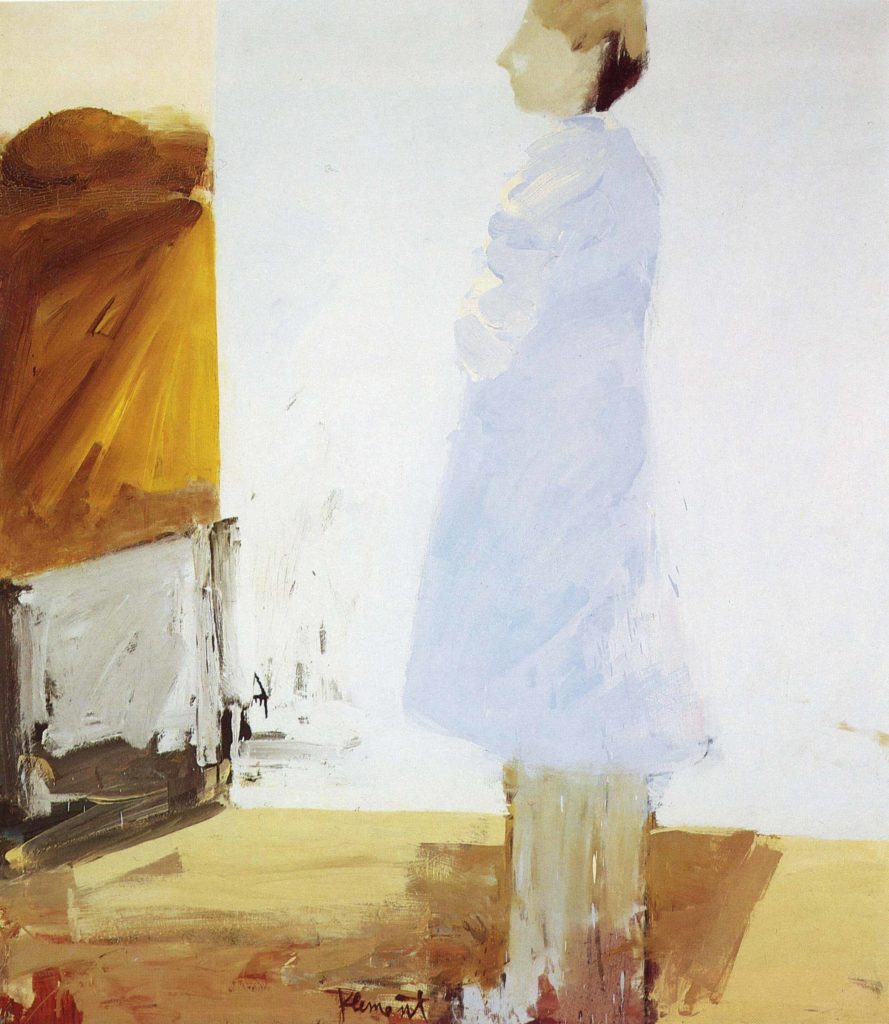
I leave on Thursday morning to attend the Fall Retreat at Spirit Rock, taught by Phillip Moffitt and others — including Tuere Sala, who just led a weekend retreat last month here in St. Louis!
The retreat at Spirit Rock will be a standard Insight Meditation retreat, but I’ll be working with Phillip on the Nine Bodies practice during this time because lately I’ve been feeling a strong interest in turning toward the fundamental mysteries of being alive, one of which is: What is consciousness? And: Where does it come from? What is its significance?
This all started while I was attending the Nature of Awareness retreat back in 2015. I didn’t know quite what to do about it then, but now that I’ve been practicing with the Nine Bodies material for a while, I’m starting to feel like I have a way forward.
Here’s a excerpt from Phillip’s book Awakening through the Nine Bodies: Explorations in Consciousness for Mindfulness Meditation and Yoga Practitioners:
“All-pervading pure awareness….is indescribable, not based on thinking or concepts; it can only be realized by practice. Yet words are necessary to point out the existence of this level of mind.
“For instance, in Tibetan Dzogchen practice, this pure awareness is called rigpa and is described as having three aspects: its essence is emptiness, its nature is radiance or luminosity, and its manifestation is responsiveness. In the Yogacara school in India, pure awareness is called Buddha nature and has three aspects that are inseparable: emptiness, radiance, and responsiveness… In the Pali texts of Theravada Buddhism this pure awareness has been referred to as the unborn, uncreated, and un-manifest.
“Of course there are large metaphysical differences in how these traditions interpret and understand this mystery of pure awareness. Even within each tradition there are disputes as to what is attained. However, there is general agreement that some fundamental change occurs that is markedly different from what characterizes the ordinary mind. In the Heart Sutra in the Tibetan tradition, this awakening is referred to in the following mantra:
“Gate, gate,
paragata,
parasamgate,
bodhi svaha.
Gone, gone,
gone beyond,
unfathomably further than gone beyond,
into awakened mind, ah.”
This Moment is Like This
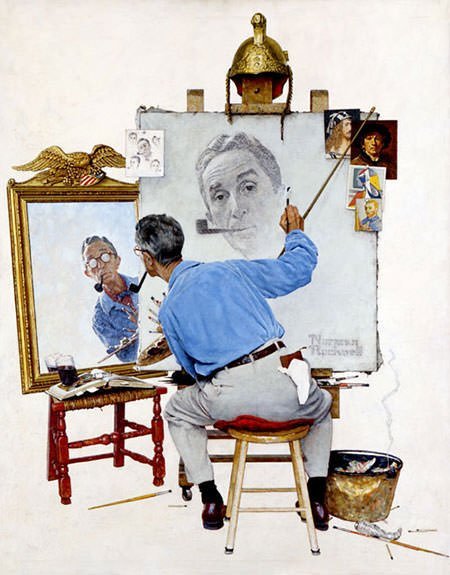
“Ajahn Sumedho repeatedly says, ‘This moment is like this,’ which sums up the sense of being fully present that you are trying to capture with the second insight of the First Noble Truth [which is that the truth of suffering must be understood].
“Making ‘this moment is like this’ a focus of your mindfulness practice can be an effective technique for understanding the difference between skillfully observing a difficult experience from within and unskillfully getting lost in the context of that experience. So when you’re meditating, you would practice noticing, ‘Back pain (or any body sensation) feels like this,’ and ‘Disappointment (or any other emotion) feels like this.’
“You can also focus your meditation inquiry on a particular life issue. Take for example a painful situation at work. You find out that your company is planning to lay people off, and your first thought is, ‘Oh, what if it’s me?’, followed by the mental anguish of imagining getting fired. This is accompanied by a physical reaction. Perhaps you feel nauseous, or your body become flushed with heat and your heart starts pounding.
“Very quickly you start telling yourself a story about how difficult your life will be once you’ve lost your job, and your mind replays the story 100 times. When that happens you are getting lost in an imagined story about the experience and creating dukkha for yourself.
“Instead, turn the situation into the focus of a mindful meditation inquiry and return to your actual experience, which is your physical and mental unease. Your only possibility for release is to acknowledge, ‘My work situation feels like this in this moment.’ In time you will see that just being with the experience brings dramatic relief.
“In all aspects of your life, you come to fully know your experience of suffering by noticing its specific qualities.
“Back pain may be felt as throbbing, piercing, contracting, or whatever the experience is in the moment when it is occurring. ‘Back pain is like this,’ you tell yourself, which points to the impersonal nature of suffering. This is simply the experience that emerges when certain causes and conditions come together. Likewise, you may know anger as a sensation of heat and tension in your body and a feeling that your mind is fixated and confused.
“You have a personal, unique experience of suffering in knowing that ‘anger feels like this.’ But the underlying difficulties that cause you to become angry are universal. As with back pain, when anger arises there is no need to identify with the experience, to become more miserable by taking the event personally. It is just another moment of life dancing, and you respond to it as best you can.
“When you are able to be fully present in this way and to say, ‘This moment is like this,’ you will experience a new kind of confidence. It is not that you immediately become fearless in the face of suffering, but your fear becomes just one more naturally arising experience, and so your suffering loses some of its power to control your life.”
— from Dancing with Life, by Phillip Moffitt
Knowing the Truth of It
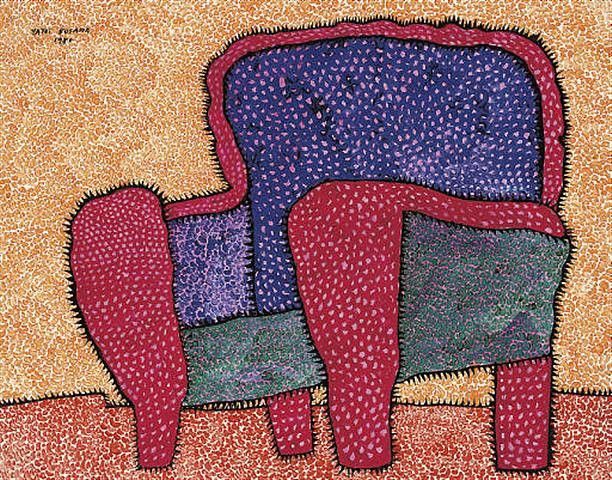
“Let me be perfectly clear that in order for you to take the Buddhist approach [to finding meaning and joy in the face of suffering], it is not necessary for you to adopt a creed, sacrifice your religion, or transform yourself into some new person.
“You simply must have faith in the possibility that understanding your suffering can bring about a radical change in how you experience life. In other words, you must suspend your doubt long enough to see for yourself what you are capable of realizing.
“At the same time, you should not underestimate this challenge, as it demands that you voluntarily show up for your own suffering with no agenda other than knowing the truth of it.”
— from Dancing with Life: Buddhist Insights for Finding Meaning and Joy in the Face of Suffering,
by Phillip Moffitt
I Take Heart…

A couple of weeks ago at Sunday Sangha I talked about how, in addition to chanting the Pali text, I use my own words to express what I mean when I recite the 5 Precepts — the classic practice of training to refrain from ethical misconduct. (My phrases are at the end of this post.)
I didn’t mention this on Sunday, but I also use my own words when doing another classic Buddhist practice — the formal Taking of Refuges, which is usually translated in English as:
To the Buddha, I go for refuge.
To the Dhamma, I go for refuge.
To the Sangha, I go for refuge.
I often recite the refuges in this way, as well chant them in the original Pali. But I also add my own way of expressing this intention, which is:
I take heart in the human capacity to Awaken.
I take heart in the Natural Laws of the Universe.
I take heart in the Company of all those who have Awakened and are Awakening.
These are a little out of the ordinary, but this is the sense of the phrases that means the most to me. Which is important, because I’m serious about what I’m doing. I need to say what I really mean because I fully intend to live by what I say.
***
In case you missed my Sunday talk, here are the 5 Precepts — in my own words — which I recite every morning (along with the 3 Refuges above):
* For my own peace of mind and for the peace of others, may I practice compassion by not intentionally killing or harming any living creature.
* For my own contentment and for the contentment of others, may I practice generosity by not taking that which is not freely given.
* For my own well-being and for the well-being of others, may I practice loving-kindness by not engaging in sexuality that is harmful.
* For my own happiness and for the happiness of others, may I practice honesty and goodwill by not speaking in ways that are false, harsh, divisive, or mindless.
* For my own safety and for the safety of others, may I practice restraint by not clouding my mind with intoxicants.
***
Meditate with Mirabai!
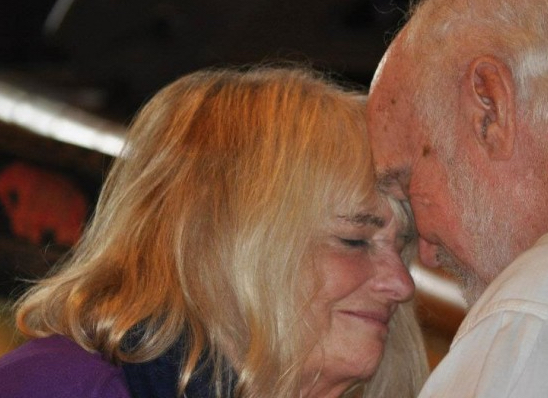
Last week Mirabai Bush led a really beautiful on-line guided meditation (only 17 minutes long) for a Facebook “Mindful Women Meditate” event, in which 3,000 people participated — including me!
Anyone who’s spent any time at all around me (in person, or on this blog), already knows that being introduced to meditation by Mirabai totally opened my heart — an experience that I have come to understand and appreciate more and more over the years. (I know I’m not alone in having had this wide-heart-opening with Mirabai. The moderator of the Facebook session calls her the “Mother of Mindfulness.”)
If you’d like a sense of what meditating with Mirabai can be like, come join her in that big, big room she talks about in this guided meditation — now posted on YouTube. (click here.)
Relax. Breath. Enjoy.
(The photo above is of Mirabai with Ram Dass at one of their annual Open Your Heart in Paradise retreats.)
They Are Kissing.

An untrained mind obscures the natural qualities of heart. As the mind becomes more clear and the heart lets loose of the constrictions created by the roughness of life, awareness can flow without judgement.
This does not mean without discernment. Discernment leads to wisdom. Awareness is the essence of discernment, but it does not reject anything.
Judgement leads to separation. Comparing leads to separation. But discernment includes everything.
A well-trained mind, collected and unified, sees the dance of opposites. The heart blossoms and the opposites unite.
The moon and sun: Kiss.
This is within you. Your sun. Your moon.
You are what you want.
***
(adapted from Awakening through the Nine Bodies, by Phillip Moffitt)
There’s This
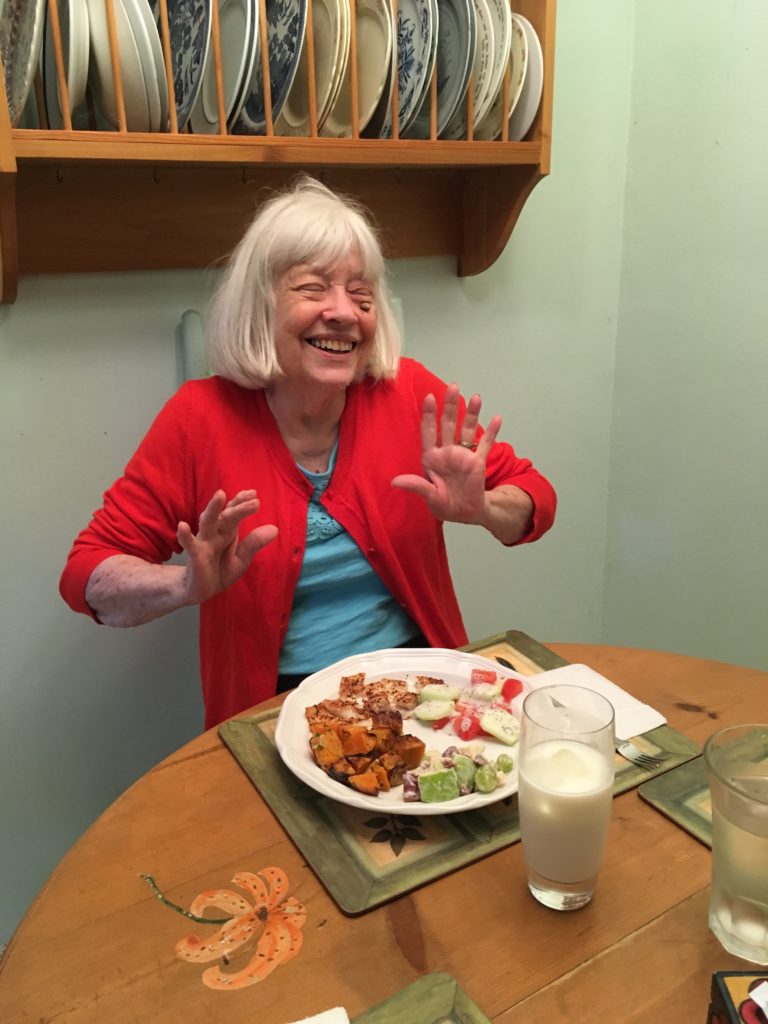
My mom turns 90 this month.
There’s stuff going on with her health that needs my attention, so probably for the next week or so I won’t be posting as often as I’d like.
Old age is hard.
Practice helps.
It’s still hard.
But there are gifts.
Postcard from Mirabai!

Mirabai sent me this photo of herself awhile back. I keep a copy on my desk because I love her. And because it makes me happy just to see her. Even in a photo!
Today she sent me this e-mail:
I’m leading a short meditation to bring women together in a contemplative on-line space on August 8 (next Thursday) at 2 pm St. Louis time. If you can, please join us.
We are exploring what it means to be mindful (and spirit-ful) women together. There’ll be a short discussion after the meditation. Many great women are in the initial group. Check it out here. It’s free (as it should be!)
Love,
Mirabai
***
This invitation is not just for me. It’s for any woman (self identified) who’s interested in mindfulness meditation. I will definitely be on the call. Hope you will too!
Breathe.

(Illustration/text by Maira Kalman, who sat a 3-day silent retreat at IMS in 2013 and then drew/wrote about the experience for Mindful magazine.)
If We Pay Attention

Now that I’m back home, I’ve starting writing again in my “Goodwill” journal where, since this is my Year of Getting to Know Goodwill, I make note of whatever acts of kindness, friendliness, generosity, etc. that I notice during the day — whether done for me, or by me, or between other people.)
So in that spirit, for today’s post I offer this entry from The Book of Delights, by Ross Gay:
“Something I’ve noticed riding on Amtrak trains, like the one I’m on right now between Syracuse and Manhattan, is that people leave their bags unattended for extended periods of time. Maybe they go to the end of the car to use the bathroom, or sometimes they go to the far end of the train to the cafe, which smells vomity like microwave cheese. My neighbor on this train — across the aisle and one row up — disappeared for a good twenty minutes, her bag wide open, a computer peeking out, not that I was checking. She is not unusual in this flaunting of security, otherwise know as trust, on the train. Nearly everyone participates in this practice of trust, and without recruiting a neighbor across the aisle to ‘keep an eye on my stuff while I use the restroom,’ which seems to be a coffee shop phenomenon. Trusting one’s coffee shop neighbor, but not the people in line, et cetera.
“I suppose, given the snugness of a train, especially if it’s full, one might speculate there’s a kind of eyes-on-the-street-ness at play, although it seemed to me, this morning, when I was first leaving my valuables on my seat for pilfering, my laptop and cellphone glittering atop my sweatshirt and scarf, most everyone was sleeping and so provided little if any eyewitness deterrent.
“I suppose I could spend time theorizing how it is that people are not bad to each other, but that’s really not the point. The point is that in almost every instance of our lives, our social lives, we are, if we pay attention, in the midst of an almost constant, if subtle, care taking. Holding open doors. Offering elbows at crosswalks. Letting someone else go first. Helping with the heavy bags. Reaching what’s too high, or what’s been dropped. Pulling someone back to their feet. Stopping at the car wreck, at the struck dog. The alternating merge, also known as the zipper. This care taking is our default mode and it’s always a lie that convinces us to act or believe otherwise. Always.”
***
He’s right. It’s become clear to me — now that I’m paying attention — that we are all swimming in a sea of goodwill.
